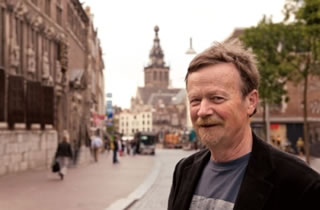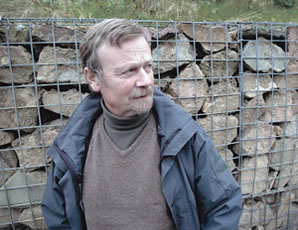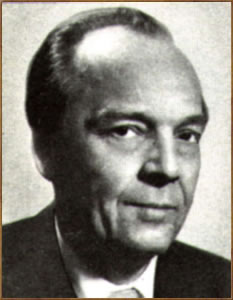De Italiaans filmregisseur, dichter en schrijver Pier Paolo Pasolini werd geboren in Bologna op 5 maart 1922. Zie ook mijn blog van 5 maart 2007 en ook mijn blog van 5 maart 2008.
Song of the Church Bells
When evening dips inside water fountains
my town disappears among muted hues.
From far away I remember frogs croaking,
the moonlight, the cricket’s sad cries.
The fields devour the Vespers’ church bells
but I am dead to the sound of those bells.
Stranger, don’t fear my tender return
across mountains, I am the spirit of love
coming back home from faraway shores.
Mystery
Daring to lift my eyes
towards the dry treetops,
I don’t see God, but his light
is immensely shining.
Of all the things I know
my heart feels only this:
I’m young, alive, alone,
my body consuming itself.
I briefly rest in the tall grasses
of a river bank, under bare
trees, then move along beneath
clouds to live out my young days.
I’m Glad
In the roughness of Saturday night
I’m glad to watch people
outside laughing in the open air.
My heart also is made of air
my eyes reflect the joy of the people
and in my hair shines Saturday night.
Young man, I’m glad with my miserly
Saturday night, I’m happy with people
I am alive, I am happy with the air.
I am used to the evil of Saturday night.
Vertaald door Adeodato Piazza Nicolai
Pier Paolo Pasolini (5 maart 1922 – 2 november 1975)
De Britse schrijver Danny King werd geboren op 5 maart 1969 in Slough, Berkshire. Hij bezocht de Yateley School, maar verliet die toen hij zestien was zonder diploma. Daarna werkte hij een tijd lang in de bouw. In 1991 volgde hij een toelatingscursus voor Farnborough College of Technology, Daarna kon hij journalistiek studeren aan The London College of Printing. Tussen 1993 en 2002 werkte hij voor verschillende tijdschriften. In de late jaren tachtig werd hij een paar keer gearresteerd weg
ens inbraak en autodiefstal. Naar aanleiding van de veroordelingen hiervoor besloot hij naar eigen zeggen om weer te gaan studeren.
Uit: The Burglar Diaries
“Fred sees red ‘What?’ says Ollie, shining the torch in my face for the umpteenth fucking time. ‘Get the instructions.’ ‘What instructions?’ ‘For the video.’
Ollie swishes the torchlight around the room a couple of times as I struggle to disconnect the cables out the back of the machine, before bringing it back to rest in my face.
‘Why?’
‘Electric told me to get ‘em while we was here.’
‘Where are they?’
What a great question. Like I’d know any better than he would. Ollie’s like that though, king of the stupid question. Ain’t no question too pointless for him to ask. It’s the same all the time, whenever we go anywhere together for the first time he becomes a real ‘where’s the bogs’ or ‘how much further is it’ merchant. One time after I had a medical and I was telling him about it, he even asked me what blood type group he was. My standard answer to all of these questions, over the years, has invariably been ‘How the fuck should I know?’ You would have thought he’d got the message by now.”
Danny King (Slough, 5 maart 1969)
De Nederlandse schrijver Arthur van Schendel werd geboren op 5 maart 1874 in Batavia. Zie ook mijn blog van 5 maart 2007 en ook mijn blog van 5 maart 2008.
Uit: De Waterman
“Aan de Merwede buiten Gorcum dwaalde op een dag van den winter een jongen over de uiterwaard. Het roode zonlicht scheen door den nevel op het water toen hij stilstond, verbaasd dat hij zoo dicht voor den oever was gekomen. Hij strekte de handen uit om te grijpen, de eend schoot weg en liep met slepende vlerk terug over de slib en het gras en hij struikelde, maar sprong op om het dier te achterhalen. Opeens zag hij het niet meer. En bukkend over plassen en brokken klei zocht hij den grond af tusschen den dijk en het water, tot hij gekwaak hoorde ver weg en den stapel rijshout ontwaarde bij de bocht van den dijk. Hij wist dat hij zoo ver niet gaan mocht, hij merkte ook dat het al avond werd. Terwijl hij ging dacht hij aan het roode gezicht van zijn vader en aan den stok, hij lette niet op de modder en hij vergat pas dat het een kwade Zaterdag zou zijn toen hij voor het rijshout stond. Lang was hij daar bezig aan den stapel, hooger dan hij reiken kon, roekeloos de takken uiteen rukkende zoodat zij rondom vielen, tot hij ten leste aan den kant van de glooiing in een spleet de vederen aanraakte, maar zij ontglipten hem weer. Toen hij rondkeek zag hij dat de schemerige mist zoo dik was geworden dat hij de rivier niet meer onderscheiden kon. Achter hem naar de stad ging de schim van den dijk uit zicht en anders was alles grauw. Hij keerde zich om, hij schrok en dook laag achter het hout.
Voor hem lag een lange plas, iets lichter dan de grond, en daarboven voor de schans op den dijk stond een gestalte, zonder beweging, een douaneman met een steek, de handen rustend op het geweer. Alleen het hoofd wendde soms van den kant van de rivier naar den stapel hout, soms naar achteren en soms naar den kant van Schelluinen. De jongen voelde zijn handen en voeten stijf van de kou. En hij hoorde geluiden, van water dat sijpelde of zoog, van een voet uit de modder, een takje dat kraakte.”
Arthur van Schendel (5 maart 1874 – 11 september 1946)
Portret door Jan Toorop
De Nederlandse schrijver, columnist en dichter Koos van Zomeren werd geboren in Velp op 5 maart 1946. Zie ook mijn blog van 5 maart 2007 en ook mijn blog van 5 maart 2008.
Uit: Een verdrietige gier
“De blik van een sperwer op een boomtak in de bosrand, Gronsveld.
Twee vrouwen liepen onder hem door. Ze waren te druk in gesprek om naar boven te kijken. De sperwer bleef zitten.
Ikzelf stond helemaal aan de andere kant van een bolle akker. Ik zag hem met mijn Leitz Trinovid 10x40B. Hij zag mij met het blote oog. Hij aarzelde geen seconde. Hij wipte op en vloog weg.
Dieren vinden het niet prettig om gezien te worden. Je wordt gezien, je wordt gegrepen, zo gaat het in de natuur maar al te vaak. En dan die ogen van een verrekijker, zo groot, zo hol en koud.
De blik van een steenuiltje in een knotwilg aan de dijk, Driel.
Het steenuiltje heeft zich in de nachtploeg laten indelen om overdag lekker in het zonnetje te kunnen zitten. Ogen dicht. Doet hij ze open, dan zie je het felst denkbare geel, een geel dat hem in combinatie met een suggestie van gefronste wenkbrauwen een strenge gelaatsuitdrakking geeft.
En hij ziet jou, je kijker.
Wat? Staat daar iemand naar mij te kijken? Ongeloof aan de ene, verontwaardiging aan de andere kant.
Zijn emoties spreken overigens niet alleen uit de ogen, hij toont ze ook, nogal overdreven, met geschokte bewegingen vankop en lijf. Acteren zonder misverstand, Ko van Dijk in zakformaat.”
Koos van Zomeren (Velp, 5 maart 1946)
De Indiaans-Amerikaanse schrijfster Leslie Marmon Silko werd geboren op 5 maart 1948 in Albuquerque, New Mexico. Zie ook mijn blog van 5 maart 2007 en ook mijn blog van 5 maart 2008.
Uit: Storyteller
“Saturday morning I was walking past Nora’s house and she was standing outside building a fire in her oven. I stopped to say hello and we were talking and she said her grandchildren had brought home a library book that had my “Laguna Coyote” poem in it.
“We all enjoyed it so much, but I was telling the children the way my grandpa used to tell it is longer.”
“Yes, that’s the trouble with writing,” I said, “You can’t go on and on the way we do when we tell stories around here.
People who aren’t used to it get tired.”
Leslie Marmon Silko (Albuquerque, 5 maart 1948)
De Amerikaanse schrijver Frank Norris werd geboren op 5 maart 1870 in Chicago. Zie voor onderstaande schrijver ook mijn blog van 5 maart 2007.
Uit: The Octopus
“She went on. Without willing it, her feet carried her in a wide circle. Soon she began to recognise the houses; she had been in that street before. Somehow, this was distasteful to her; so, striking off at right angles, she walked straight before her for over a dozen blocks. By now, it was growing darker. The sun had set. The hands of a clock on the power-house of a cable line pointed to seven. No doubt, Minna had come long before this time, had found her mother gone, and had–just what had she done, just what COULD she do? Where was her daughter now? Walking the streets herself, no doubt. What was to become of Minna, pretty girl that she was, lost, houseless and friendless in the maze of these streets? Mrs. Hooven, roused from her lethargy, could not repress an exclamation of anguish. Here was misfortune indeed;here was calamity. She bestirred herself, and remembered the address of the boarding-house. She might inquire her way back thither. No doubt, by now the policeman would be gone home for the night. She looked about. She was in the district of modest residences, and a young man was coming toward her, carrying a new garden hose looped around his shoulder.”

Frank Norris (5 maart 1870 – 25 oktober 1902)
De Italiaanse schrijver Ennio Flaiano werd op 5 maart 1910 in Pescara geboren. Hij bezocht internaten in Fermo, Chieti, Senigallia en Brescia en vanaf 1922 bezocht hij een gymnasium in Rome. Hij studeerde daarna architectuur, maar voltooide de studie niet. In 1939 begon hij te werken als journalist en criticus voor het weekblad Oggi. Tijdens WO II diende hij als soldaat. Zijn eerste draaiboek schreef hij voor de film Pastor Angelicus van Romolo Marcellini. Zijn enige roman Tempo di uccidere schreef hij in 1946. In 1989 werd deze nog door Giuliano Montaldo verfilmd. In 1949 werd hij redacteur bij Il Mondo en begon hij meer voor de film te schrijven, vooral voor Fellini (La dolce vita, 8 ½) Ook publiciceerde hij vervolgens verhalen en een komedie.
Uit: A Martian in Rome
“October 12–Today a Martian descended in his spaceship upon Villa Borghese, in the racetrack lawn. So I will try to maintain, in writing these notes, the calm that I completely lost at the announcement of this incredible event, to repress the anxiety that immediately pushed me into the streets to mingle with the crowd. The entire suburban population poured into the city’s center, blocking traffic completely. I must say that everyone’s joy and curiosity is mixed with a hope that yesterday could have seemed absurd, and is instead growing more intense with every passing hour. The hope that “now everything will change.” Rome immediately assumed the slovenly and homely appearance of grand occasions. There’s something in the air that is reminiscent of July 25th, of 1943; the same people hugging; the same old commoner women that walk by heading towards imaginary barricades, shouting the praises of freedom; the same army reserve officers that wore their uniforms, convinced they would be able, in their getup, to make their way through the crowd and reach the riding track: which is instead guarded by police tanks and two regiments in fighting trim.
You already can’t get through Piazza Fiume: the packed crowd, swaying, waits, sings, shouts, improvises dances. I saw the first drunks. The roofs of the buses (stuck in the streets like ships surprised by winter in a glacial sea) were swarming with young people and screaming children who were waving large dirty flags. The stores have lowered their rolling shutters. At times the blowing wind brings a distant burst of applause that reignites curiosity and causes disorientation, a greater and more cheerful confusion.”
Ennio Flaiano (5 maart 1910 – 20 november 1972)
De Duitse dichter, schrijver en vertaler Fritz Usinger werd geboren op 5 maart 1895 in Friedberg, Hessen. Hij werkte eerst als docent, vanaf 1949 als zelfstandig schrijver. In 1946 ontving hij als tweede schrijver na de oorlog de Georg-Büchner-Preis. Hij publiceerde tien dichtbundels, de laatste, Der Stern Vergeblichkeit, in 1962. Ook schreef hij veertien essaybundels.
DIR ZUM GEDÄCHTNIS
Dies ist die Zeit, da ich nach allen Seiten
Die Boten meiner alten Liebe schicke,
Nur dich zu suchen und mir zuzuleiten,
Damit ich endlich wieder dich erblicke,
Die so entschwunden ist und nicht z
u finden,
Einst mir ganz nah und jetzt in fernster Ferne.
Was mag dich ganz ins Unsichtbare binden,
So lautlos, wie auf einem andren Sterne?
Wie eine Sonne schick ich meine Strahlen
Welthin, dass nirgendwo ein Winkel bliebe,
Drin du nicht fühltest, wie zu vielen Malen
Ein Kuss dich anrührt dieser langen Liebe.
Und wenn auch niemals Antwort zu mir fände
Die Strahlen glänzen selbst in leere Welten.
Liebe ist so, dass nie ein Nein sie bände,
Auch wenn ihr keine Antwort-Worte gelten.
Dir zum Gedächtnis schenke ich mich immer
An Wolken, Winde, gar an fremde Sterne.
Den Himmeln leihe ich noch zarten Schimmer,
Erinnerung an dich, in fernste Ferne.
Und wenn dereinst am Ende aller Zeiten
Die Gräber klaffend Leib und Geist entlassen,
Am Jüngsten Tag, such ich durch Himmelsweiten,
Bis ich dich finde, deine Hand zu fassen.
Fritz Usinger (5 maart 1895 – 9 december 1982)
De Duitse dichter en schrijver Friedrich Schnack werd geboren op 5 maart 1888 in Rieneck, Unterfranken. Na een opleiding tot koopman werkye hij eerst bij een bank en een handelsfirma. Als soldaatv in WO I raakte hij in gevangenschap op het eiland Prinkipo. In 1923 werd hij feuilletonredacteur bij de Dresdner Neuesten Nachrichten“ en later bij de „Neuen Badischen Landeszeitung“ in Mannheim. Vanaf 1926 was hij zelfstandig schrijver. Het meeste succes had hij als schrijver van verhalen en romans, zoals de trilogie Sebastian im Wald, 1926; Beatus und Sabine, 1927; Die Orgel des Himmels, 1927.
Die Linde
Unter deinem mächtigen Gestühle
Überfällt mich ahnungslose Kühle,
Strömt mich an des Sommers Atemstoß,
Und ich spüre aus der Blätter Wehen
Fremden Lebens heimliches Geschehen,
Deine Seele groß.
Wie sie sich verzweigt im Baume,
Aufwärts steigt und wirkt im Raume,
Überwindend ihren Erdengrund:
Wie sie schauert, klingt und leuchtet,
Lichtgesalbt und regenangefeuchtet,
Mit dem Himmel schloss sie ihren Bund.
Wölbig wohnen, wunderbare Haube,
Licht und Finsternis in deinem Laube,
Nacht und Tag.
Wenn die Abendsterne blinken,
Wenn die Morgensterne sinken,
Grüßt sie deines Herzens Schlag
Friedrich Schnack (5 maart 1888 – 6 maart 1977)
De Duitse schrijver en filosoof Moritz Carrière werd geboren op 5 maart 1817 in Griedel, hessen. Hij studeerde in Gießen, Göttingen en Berlijn, ging vervolgens enkele jaren op reis naar Italië en promoveerde daarna in Gießen in de filosofie. Vanaf 1854 was hij hoogleraar kunstgeschiedenis aan de Akademie der Bildenden Künste in München.
Uit: Das Wesen und die Formen der Poesie
Ich singe wie der Vogel singt,
Der in den Zweigen wohnet,
Das Lied, das aus der Kehle dringt,
Ist Lohn, der reichlich lohnet.
In diesen Worten Goethe’s ist es schon gesagt daß der Lyriker die eigene Innerlichkeit ausspricht, daß er in der Selbstbefreiung und dem Selbstgenuß des Gefühls seine Befriedigung findet. Wir bezeichnen die lyrische Poesie als die subjective; subjectiv aber nennen wir einmal das persönliche Seelenleben im Unte
rschied von der Außenwelt und den Dingen, dann aber auch dasjenige was nur einer bestimmten Individualität angehört, wie wenn wir im Unterschied von dem Allgemeingiltigen, durch sich selbst Einleuchtenden von einer subjectiven Wahrheit reden, die gerade nur für einen Einzelnen Ueberzeugungskraft hat und von dessen Gemüthsstimmung getragen wird. Allein indem dies ganz Persönliche, indem das Gefühlsleben in individueller Unmittelbarkeit ausgesprochen wird, erlangt es die Weihe der Kunst dadurch daß die hier angeschlagene Saite in allen Herzen mittönt, weil das allgemeine Wesen der Menschheit in seiner Tiefe berührt worden. So ist Mignons Lied von Italien der Sehnsuchtslaut dieses Kindes nach dem fernen schönen Vaterlande; aber es erklingt darin zugleich der geheimnißvolle Zug in die Ferne, das Heimweh der Seele [190] nach einem verlorenen Paradies, das in jedem Herzen schlummert.”

Moritz Carrière (5 maart 1817 – 19 januari 1895)
Akademie der Bildenden Künste, München, 19e eeuw
(Geen portret beschikbaar)





















